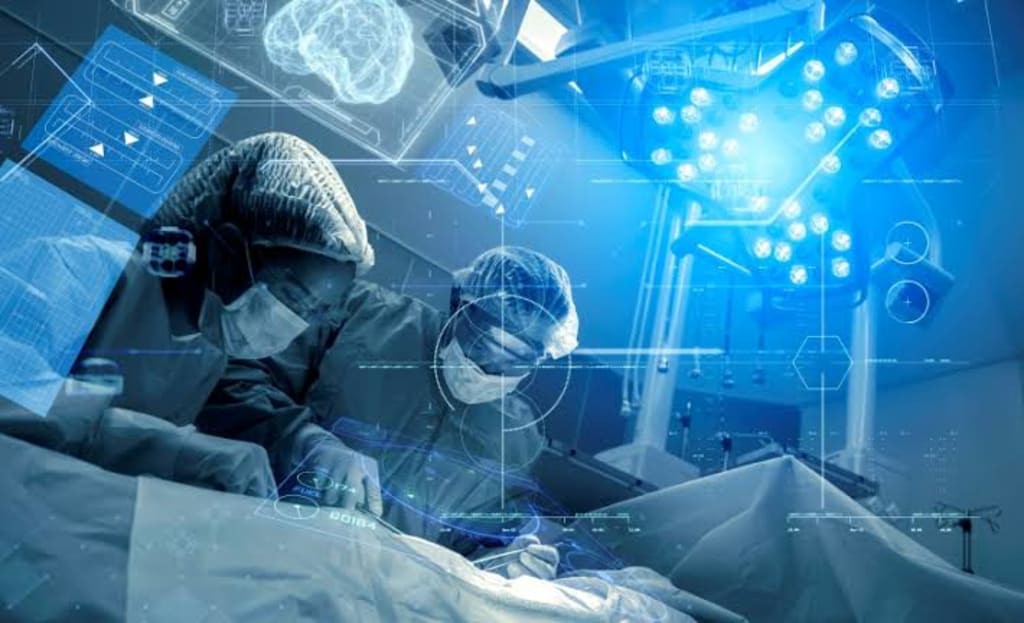Artificial Intelligence in Healthcare
Transforming the Industry

Introduction:
Artificial Intelligence (AI) has rapidly emerged as a transformative force across various industries, and healthcare is no exception. With its ability to process massive amounts of data, recognize patterns, and generate insights, AI is revolutionizing the healthcare landscape. From early disease detection to personalized treatment plans, AI is empowering healthcare professionals, improving patient outcomes, and driving innovation. In this article, we will explore the incredible impact of AI in healthcare, showcasing inspiring real-life examples of its transformative potential.
Early Disease Detection:
One of the most significant advantages of AI in healthcare is its potential to enable early disease detection. By analyzing vast datasets, AI algorithms can identify subtle patterns that may go unnoticed by human clinicians. For instance, researchers at Stanford University developed an AI algorithm that could detect skin cancer with remarkable accuracy. The algorithm, trained on a dataset of thousands of images, was able to classify skin lesions as benign or malignant, rivaling the performance of expert dermatologists. This breakthrough in early detection can significantly enhance survival rates and reduce the burden on healthcare systems.
Personalized Treatment Plans:
AI has the ability to analyze vast amounts of patient data, including medical records, genetic information, and treatment outcomes. By integrating this data with advanced algorithms, AI can generate personalized treatment plans tailored to individual patients. This approach ensures that patients receive the most effective interventions while minimizing the risk of adverse effects. For instance, IBM Watson for Oncology uses AI to analyze patient data and provide oncologists with evidence-based treatment options. By considering a patient's unique characteristics, including genetic markers and medical history, AI can help physicians make more informed decisions, leading to improved patient outcomes.
Enhancing Medical Imaging:
Medical imaging plays a crucial role in diagnosing and monitoring various diseases. However, the interpretation of complex images, such as MRIs and CT scans, can be time-consuming and prone to human error. AI is revolutionizing medical imaging by automating the analysis process and enhancing accuracy. For example, Aidoc, an AI-powered radiology platform, analyzes medical images to prioritize critical cases and flag abnormalities. By rapidly identifying potential issues, AI assists radiologists in providing timely and accurate diagnoses, ultimately saving lives.
Virtual Assistants and Chatbots:
AI-powered virtual assistants and chatbots are transforming the way patients interact with healthcare systems. These intelligent systems can provide personalized healthcare advice, offer medication reminders, and even detect potential adverse drug interactions. Ada, a popular AI-based health app, utilizes machine learning algorithms to assess symptoms reported by users and provide accurate initial assessments. By empowering patients with accessible and reliable information, AI virtual assistants contribute to improved self-care and reduce the burden on healthcare providers.
Predictive Analytics for Public Health:
AI is also proving invaluable in the realm of public health. By analyzing diverse datasets, including social media posts, weather patterns, and demographic information, AI algorithms can predict disease outbreaks, assess the impact of public health interventions, and optimize resource allocation. For instance, BlueDot, an AI-powered platform, successfully detected the early signs of the COVID-19 pandemic by analyzing global travel data. By providing timely alerts, AI-driven predictive analytics can enable governments and healthcare organizations to take proactive measures and save lives.
Conclusion:
Artificial Intelligence is undoubtedly transforming the healthcare industry, revolutionizing the way diseases are detected, diagnosed, and treated. Through early disease detection, personalized treatment plans, enhanced medical imaging, AI virtual assistants, and predictive analytics, the potential of AI in healthcare is inspiring. As AI continues to evolve, it will play an increasingly critical role in improving patient outcomes, reducing healthcare costs, and advancing medical research. However, it is essential to ensure that AI systems are developed and deployed ethically and in collaboration with healthcare professionals to maximize their benefits. With the right balance of human expertise and AI technology, the future of healthcare holds immense potential.
While AI is transforming the healthcare industry, it is crucial to address potential challenges and ensure ethical practices. Privacy and security of patient data are of the utmost importance. Healthcare organizations must implement robust protocols to protect sensitive information and adhere to strict data privacy regulations. Additionally, it is essential to establish transparent guidelines for the development and deployment of AI algorithms, ensuring they are unbiased, explainable, and accountable.
Collaboration between AI and healthcare professionals is key to harnessing the full potential of this technology. AI should be viewed as a powerful tool that augments human expertise rather than replacing it. By working together, healthcare providers and AI systems can deliver more accurate diagnoses, personalized treatment plans, and better patient care. Continuous education and training programs should be implemented to equip healthcare professionals with the knowledge and skills necessary to seamlessly integrate AI into their practice.
The transformative impact of AI in healthcare extends beyond individual patient care. It has the potential to revolutionize healthcare on a global scale. AI-driven systems can aid in resource allocation, optimize hospital workflows, and improve public health interventions. By leveraging predictive analytics and real-time data analysis, healthcare organizations can respond swiftly to outbreaks, allocate resources efficiently, and develop effective preventive strategies.
Furthermore, the integration of AI technology in remote areas and developing countries can bridge healthcare disparities. AI-powered mobile applications can provide access to quality healthcare information and preliminary diagnoses, enabling individuals in underserved regions to receive timely and appropriate care. This democratization of healthcare has the potential to revolutionize the lives of millions.
As we witness the transformative power of AI in healthcare, it is important to recognize the need for responsible innovation. Ethical considerations should be at the forefront of AI development, ensuring that patient autonomy, privacy, and equity are upheld. Regulation and oversight should be established to govern the use of AI in healthcare, fostering trust and accountability among patients, healthcare providers, and technology developers.





Comments
There are no comments for this story
Be the first to respond and start the conversation.